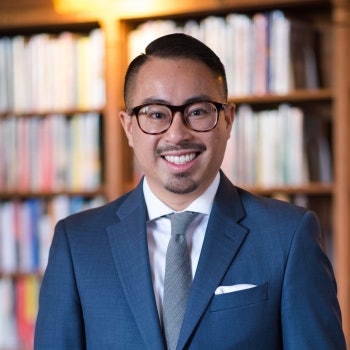 Dr. Mike Hoa Nguyen
Dr. Mike Hoa Nguyen
Students often express “that they have never studied anything like it before,” an analysis of student evaluations shows.
At Queens College – a City University of New York, or CUNY school in Flushing, New York – the campus Writing Center offers multilingual tutors to “make it easier and more welcoming” for a student body whose ancestries can be traced to 153 countries.
At Mt. San Antonio College – a large, two-year public college in Walnut, California – students regularly credit a program called ARISE with providing peer mentors, culturally relevant courses and a sense of community.
Student Angelyca Sarrol says the program has given her a “place to focus on my studies while also learning more about my culture.”
“I have met so many amazing people who continue to teach me new things and push me to be a better person,” says Sarrol, who now serves as a peer mentor in the program. A communication major, Sarrol hopes to transfer to a California State University system school in fall of 2025.
All three of these initiatives – the refugee course, the ARISE program and the multilingual writing center – are funded through federal grants for schools designated as an Asian American and Native American Pacific Islander Serving Institution – or AANAPISI. The designation is for schools where at least 10 percent of the undergraduate population is Asian American, Native Hawaiian, and Pacific Islander.
For Dr. Mike Hoa Nguyen, an assistant professor of education at New York University, the refugee course, the multilingual writing center and ARISE program all serve as prime examples of the kind of culturally relevant courses and programming that help students from this demographic succeed. He published his fi ndings in a 2024 study for The Review of Higher Education.
“These types of classes help students develop a sense of identity, help build their sense of belonging and give them confidence,” Nguyen says. “They work to help students navigate college, build peer networks, connect with staff, connect with faculty, provide different types of training, including financial literacy, all sorts of really wonderful types of supports – wraparound supports – that are not commonly found.”
With the Trump administration setting its sights on eliminating all DEI – or diversity, equity and inclusion programs – in higher education and other sectors, the future of AANAPISIs – one of the youngest types of federally-designated MSIs, or Minority-Serving Institutions – is uncertain. Scholars such as Nguyen say they worry about the future of AANAPISIs – which they note are already underfunded – under Trump 2.0.
Those concerns are heightened now that President Trump has issued an executive order to “take all necessary steps to facilitate the closure of the Department of Education.” The department administers grants for AANAPISIs and MSIs.
“The Executive Order, coupled with the ongoing demolition of the U.S. Department of Education and mass layoffs of experienced and dedicated civil servants, will have a disastrous effect on the ability of AANAPISIs to serve students and their families, thus impacting our country’s economic vitality,” Nguyen says.
Without AANAPISI funding, the Queens College Writing Center’s overall capacity to serve students “would be significantly reduced,” says Dr. Caroline K. Hong, an associate professor of English and Asian American community studies at Queens College, as well as director of the school’s AANAPISI Project.
Nguyen also worries that AANAPISIs could also fall victim to the Trump administration’s efforts to cut what it views as a “waste” of taxpayer dollars.
“The assumption is that this particular Congress, as well as the administration, is looking at cutting everything in the federal government,” Nguyen says. “And so, one could then surmise that they might be interested in cutting MSI funding at the same time, right? And if they do that, then certainly AANAPISIs would be in that group.
“So, I think it’s important to note that without this type of sustained federal investment, a lot of students are gonna be underserved and it’s gonna greatly impact student success,” Nguyen says. “And then that, of course, translates in the long run to [negative effects on] economic vitality and prosperity.”
To better understand the impact of specific programs offered through AANAPISI grants, Diverse took a closer look at the visiting professorship at UConn, the writing center at Queens College and the ARISE program at Mt. San Antonio College. Evidence of positive results was not hard to find.
UConn
Rahman, the visiting professor at UConn Hartford, shared information extracted from student evaluations of his Critical Refugee Studies course.
“They describe it as crucial to understanding not only refugees but also the broader factors – such as economics, politics, and climate change – that shape how refugees are perceived,” a UConn analysis of student evaluations of the course shows. “Many also appreciate the opportunity to critically engage with how perceptions are constructed and what the concept of ‘refugee’ means for nation-states.”
As a visiting professor, Rahman also teaches a similar course called Critical Muslim Studies.
Dr. Jason Chang, an associate professor of history and director of the Asian and Asian American Studies Institute at UConn Storrs, says UConn Hartford’s AANAPISI grant covers more than just the cost of a visiting professor. It also covers the cost of a mental health clinician who understands the culture of AANAPISI students. UConn Hartford’s AANAPISI project – formally known as the Transformation, Equity, Access, and Sense of Belonging, or TEAS project – is being funded at $1,958,724 for five years from 2023-2028.
“We took out two years from the grant just to find the right person,” says Chang, noting that the clinician can help students with issues such as how to balance “life, religion, family and schoolwork” during, for instance, the Islamic month of fasting called Ramadan. “The average academic advisor would not be able to help students navigate those things,” Chang says, adding that someone with the relevant cultural knowledge “really has the ability to speak to them and to connect in things that they value.”
“The average academic advisor would not be able to help students navigate those things,” Chang says, adding that someone with the relevant cultural knowledge “really has the ability to speak to them and to connect in things that they value.”
ARISE program
Alumni of Mt. San Antonio College speak glowingly about the ARISE program.
“ARISE helped me find a community at Mt. San Antonio College. I found mentors who encouraged me to be bold in my pursuit of higher education,” says Ana Bordallo, a class of 2016 graduate who went on to earn her bachelor’s degree in policy analysis and management in 2018 from Cornell University, where she minored in demography and inequality studies. She interned at the United Nations Indigenous Peoples and Development Branch in New York City and the Massachusetts Office of the Attorney General and Judge Patti B. Saris of the U.S. District Court for the District of Massachusetts. Now a Harvard Law School graduate, Bordallo is currently a business litigator and pro bono advocate who represents clients in complex commercial matters.
“I also connected with other Pacific Islander students who helped me feel at home even when home was an ocean away,” Bordallo says. “I maintain many of these friendships over eight years later.”
Queens College
At Queens College, multilingual students hired to tutor their peers through the writing center “gain work experience, learn about best practices for tutoring and mentoring, and organize workshops and events” for the writing center and the community at large, Hong, the director of the Queens College AANAPISI Project, notes.
Hong says the school has hired eight tutors who have tutored “over 240 unique students, whose home languages include Arabic, Bangla/Bengali, Burmese, Chinese, Farsi, Hindi, Guyanese Creole, Khmer, Korean, Nepali, and Urdu.”
Early data findings show that, in the Spring 2023 semester, on average, students who received multilingual tutoring through the AANAPISI project completed more credits than those who didn’t, Hong says. “And we have received overwhelmingly positive feedback about the program from both tutors and tutored students,” she says.



















